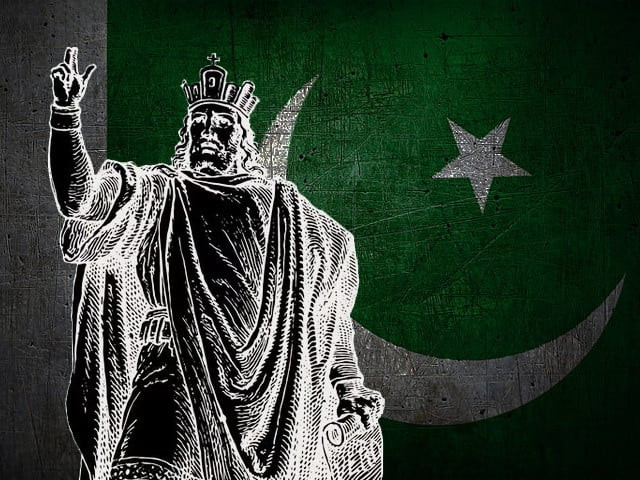As the country witnessed a rather emotional return of the bastion of the House of Sharif on October 21, 2023, a pressing question remains regarding the future outlook of leaders to come. Are we to remain dependent on the exile and return of leaders for the country to function?
In one of his popular dialogues – the ‘Republic’ – Plato presents the framework of a just society. As loaded as this term may be, one of the key features of this society was the presence of a ‘philosopher king’. An individual who governs his subjects and his own life while pursuing the ultimate truth and thereby discovering that notion of good, which encompasses justice, equity and equality. Plato argues that such a figure would be suited to the role of a leader as his spirit would not be encumbered by greed and lust, which are traits of human beings found in a state of nature (i.e. people left without a state or collective union). Plato’s assumption was that the absence of disingenuous ambition would allow the philosopher to enact policies beneficial for his subjects. Without delving into the merits of Plato’s arguments in this dialogue, the question remains whether such a figure could be allowed to emerge from amongst the 230 million people residing in Pakistan.
It appeared for a moment that former prime minister Imran Khan might represent the stoic ideals encapsulated in Plato’s philosopher. Placed into that coveted throne was a man who preached ideals of morality by rinsing the corridors and halls of parliament. As many of his cultists argue, he had ‘nothing to gain’ from coming to Pakistan and contesting elections to become the leader of this great nation. Before his ardent supporters give out a yelp of excitement over this dignified allusion to the selfless king, it is worth noting that Imran was operating in a vacuum, divorced from practical realities under which he had been anointed as leader by the forces that be. The abrupt divorce between Islamabad and Rawalpindi towards the end of Imran’s premiership signalled his amnesia about how his coronation was arranged. It seemed that pride, vainglory and hastiness trumped over the pursuit of justice. Slogans were thrown around, claims were made, and members of the opposition eliminated; what started as a programme of accountability remained just that – a programme. To what end, no one knows, nor did anyone care. As long as petrol prices remained low, the thieves in their cells, and inflated figures of GDP growth were provided, we stood at the cusp of greatness. The wheel continued to rotate rather than being re-imagined.
One may approach the subject of Nawaz Sharif’s return with similar scepticism due to his turbulent tenures as premier: an inevitable tussle with the not-so-smooth operators leading to his court martial and subsequent dismissal. At Minar-e-Pakistan, we witnessed a somewhat emotional Nawaz Sharif, a father returning to his children after a journey through time. However, Nawaz may not have noticed that the younger of the bunch may no longer be willing to welcome him with open arms as long as their treasured chief remains in Adiala Jail. The subtle difference that is always associated with the love of the people for their leader lies within the fear or generosity of the said leader. As of now, the gems of history have been presented before us; however, the episodes of disqualification and the move to London have left the populace feeling uneasy.
With the ushering of each leader, a different dream was sold to the public. Upon Partition, it was that we were free from the persecution and tyranny of our neighbours; Pakistan then became a treasured ally of the West; we were the last stronghold in Asia against the communist wave; our nation bore the brunt of the war on terror, countless lives were lost and we were told that it was for the greater good; then we cosied up to our Chinese benefactors so that a programme of economic mobilisation was initiated; and now we yearn for true freedom. It appears that we have come full circle now that, once again, freedom is being demanded, but freedom from what or whom. Freedom from our circumstances, freedom from our declining status, or freedom from those who represent our interests. The preceding three demands represent the ambivalence of feelings amongst the interests of people along a polarised spectrum of socio-economic classes.
As rebellious children, we ask rather rudely: what has this 76-year-old state provided us? Broken dreams and broken people. While ambassadors were being driven across the border, our dictators and politicians were concerned with the acquisition of marvels of German and Japanese engineering. As a piece of our country broke away, our president recovered from his stupor in the early hours of the morning. As we were being integrated into the Chinese Belt and Road Initiative, assets in London were being protected by neat corporate layers. Finally, as accountability and justice were being delivered, disputes over the appointment of a military chief translated into a swift ejection from parliament.
Could it be that our political environment has never been conducive to the grooming of philosopher kings or that the divide between the two classes – oligarchs and workers – has enlarged to the extent that the only option that remains is tyranny? Policies have been made as part of knee-jerk reactions to various local and international plights without foreseeing future repercussions. It appears that Pakistan may not be capable of producing philosopher kings. However, one could argue that it simply requires an immediate cessation of prodigal habits to favour the gradual cultivation of empathetic leaders at the very least.



COMMENTS
Comments are moderated and generally will be posted if they are on-topic and not abusive.
For more information, please see our Comments FAQ